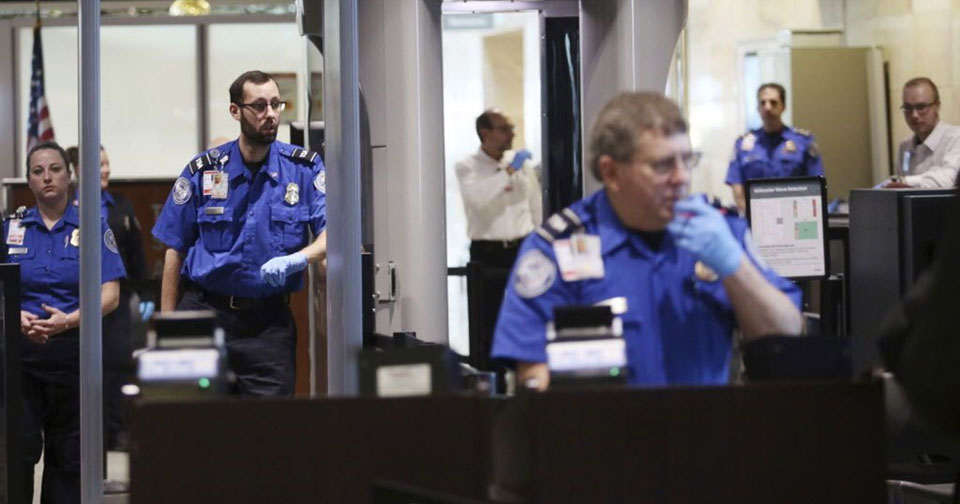
WASHINGTON—Imagine having to sue your boss so you can return to work, and get paid.
That, in essence, is what the nation’s largest federal workers union, the American Federation of Government Employees (AFGE) and attorneys it hired did on Dec. 31.
The union, some of whose members are among those locked out by Trump’s shutdown of about a third of the federal government, told the U.S. Court of Federal Claims the president’s lockout harms its members – by forcing them either to sit at home unpaid or come to work without pay – and the public.
It wants the judges to order Trump to pay the more than 400,000 workers the administration deems “essential” – such as the airport screeners – now, rather than forcing them to wait until their agencies are formally funded and reopen.
Those workers are still toiling, even though they won’t get paid, and don’t know when or whether they will. Trump sent another 400,000 home, too. They’re not “essential,” and the suit doesn’t cover them.
Trump shut down the Commerce, Justice, State, Agriculture, Transportation, Housing, Homeland Security and Interior Departments, the Environmental Protection Agency and other offices at midnight on Dec. 21 because Congress wouldn’t cave to his demand for $5 billion to build his Mexican Wall. It still won’t.
Congress passed and Trump signed money bills for the Defense, Labor, Education and Health and Human Services Departments and related agencies, so those workers get paid.
Congressional Democrats, who took over the House on Jan. 3, plan to pass two separate money bills that day to get the Trump-closed agencies up and running again. One will be for the Homeland Security Department, through Feb. 8, without money for Trump’s anti-Hispanic wall. The other, covering the rest of the unfunded sections of the government, will run through the end of the fiscal year on Sept. 30.
But those measures may well go nowhere in the GOP-run Senate, where Majority Leader Mitch McConnell flatly says solons won’t pass anything Trump won’t sign – and Trump vows, gleefully, that he won’t sign a money bill unless he gets his Mexican Wall.
That’s led AFGE to court, to try to overcome, or evade, Trump, through a judicial order him to pay the workers. No date has been set for the trial: The courts are among the agencies Trump has shut.
“Our members put their lives on the line to keep our country safe,” AFGE President J. David Cox said. “Requiring them to work without pay is nothing short of inhumane. Positions considered ‘essential’ during a government shutdown are some of the most dangerous jobs in the federal government.”
The workers and their families “deserve the decency of knowing when their next paycheck is coming and they will be paid for their work. Our intent is to force the government and the administration to make all federal employees whole,” he added.
This isn’t the first time the GOP shut down the government and forced “essential” workers to sue. Sen. Ted Cruz, R-Texas, forced a 16-day shutdown in 2013, in an unsuccessful attempt to force repeal of the Affordable Care Act. Some “essential” workers sued, then, in the same court. Under federal law, only those who opted in could sue, and 25,000 did.
The 25,000 won back pay in 2014, and double that for five days’ worth of damages in 2017. They later got paid, catch-up, when the government reopened, but not the double damages. In both 2013 and now, the government violated the nation’s basic minimum wage and overtime pay law, the Fair Labor Standards Act, attorney Heidi Burakiewicz, of the private pro-worker firm AFGE retained, said.
“Approximately 420,000 federal employees are continuing to work, but don’t know when they will get their next paychecks,” she explained. “This is not an acceptable way for any employer, let alone the U.S. government, to treat its employees. These employees still need to pay childcare expenses, buy gas, and incur other expenses to go to work every day and yet, they are not getting paid. It is a blatant violation of the Fair Labor Standards Act.”
As the union sued for the workers’ pay, the workers themselves took to social media to trade comments and descriptions of trying to make do – or not.
“It is non-union, low-wage, workers who are mostly invisible to pundits and policy-makers who will suffer the most. It’s disgraceful exploitation,” one author, naming himself “DCBen,” tweeted in #ShutdownStories.
From “Oceans of hope”: “Single mom, single income. If my pay from the last two weeks shows up I have enough to pay bills, but not buy food. We live direct deposit to direct deposit, & something vital is always breaking – car brakes, stove, furnace. nothing goes until this is over.”
Melissa of the “VetsResistSquadron”: “I am a disabled veteran who has been waiting for service-connected surgery for over a year (yes it takes that long), can’t get my final approval because of gov’t shutdown. This delay is making my future health care costs more expensive for all taxpayers.“
“Thankful I have two jobs because I’m not getting paid at TSA,” Heather Manus tweeted, referring to the Transportation Security Administration’s screeners, such as her. “But I still have to show up. Which means I have to work both jobs every day, sleeping two to three hours at night, just to not even break even on bills.”
“My children don’t care about walls,” tweeted Sarah Watterson, a Marine Corps veteran, like tens of thousands of the other locked-out federal workers. “They do care about having a warm house to live in, a car to ride in, clothes to wear, and food in their bellies — none of which is possible if their mom can’t go to work.”










